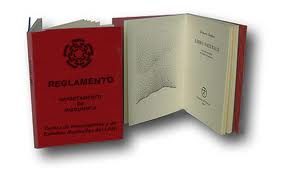 A regulation it's a ordered and coherent set of precepts or norms that will govern work in a company, in an organization, coexistence in an apartment building, in a community, a sport, among other alternatives.
A regulation it's a ordered and coherent set of precepts or norms that will govern work in a company, in an organization, coexistence in an apartment building, in a community, a sport, among other alternatives.
A regulation implies a group of guidelines and norms that govern an activity. The main purpose of a regulation is to establish an adequate order so that the activity carried out takes place through reasonable channels.
Limitations and difficulties
Although the notion of regulation is considered necessary and useful, it is not without its difficulties. There are several circumstances that can negatively affect regulations: 1) they must be easily interpretable, in such a way that it is not possible to understand them differently, 2) they should be based on experience and that they are not too theoretical, 3) Any norm or rule must be evaluated by someone (for example, a referee) and it is common for the interpreter of the norms to make mistakes or be prejudiced.
Written and unwritten rules
All regulations are reflected in a written document detailing what is allowed and what is prohibited in an activity. In this way, if someone doubts about a specific standard, they can consult the document where it appears and know exactly what the standard in question says. The regulations usually incorporate changes and transformations to improve in some sense (this is what has happened with basketball, a sport that has incorporated new rules to make the game more spectacular).
However, in most regulated activities we find unwritten rules. As they are not reflected, they are not mandatory but tradition makes them "mandatory". If we take football as a reference, the unwritten rules are diverse (exchanging shirts, respecting the opponent's national anthem or not trying to play if there is an injured player on the ground on the other team).

Simplicity and complexity
There are very simple regulations and others that are really complex. The Benedictine order is based on the well-known Benedictine rule, which consists of a set of articles that are usually synthesized in one, ora et labora (pray and work). The regulatory complexity can be found in some legal texts (for example, official gazettes).
In children's games we can observe that children establish their own regulations in a natural way. And in this sense, it is difficult to imagine a social organization without rules, since even uncivilized humans were organized based on basic principles that served to order daily life. As a society advances, the complexity of the guidelines grows and the need inevitably arises to establish regulations for the set of activities.
Live without rules
 If someone does not respect social rules, it is likely that he is a provocateur, a criminal or that he suffers from some type of disorder. Throughout history we find individuals who have questioned the current social rules (the philosopher Diogenes de Sínope was opposed to any type of normative imposition since he understood that it is a limitation of individual freedom). Whoever does not respect the imposed legal norms becomes an offender, a criminal or a mobster. Some mental illnesses are detected when people live outside the conventional rules.
If someone does not respect social rules, it is likely that he is a provocateur, a criminal or that he suffers from some type of disorder. Throughout history we find individuals who have questioned the current social rules (the philosopher Diogenes de Sínope was opposed to any type of normative imposition since he understood that it is a limitation of individual freedom). Whoever does not respect the imposed legal norms becomes an offender, a criminal or a mobster. Some mental illnesses are detected when people live outside the conventional rules.
The absence of rules is associated with disorder and anarchy. However, excessive regulation is not always effective, since what is important is not the rule itself but its compliance.
The human being faces a dichotomy regarding the idea of rule: follow them or break them. In normal situations, it is reasonable to abide by them but on some occasions non-compliance may be justified (for example, some cases of civil disobedience have been inspired by a noble ideal).
Photos: iStock - Steve Debenport / shaunl









